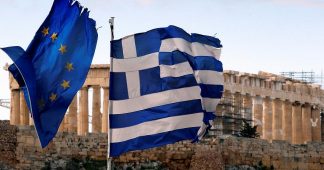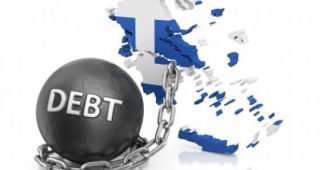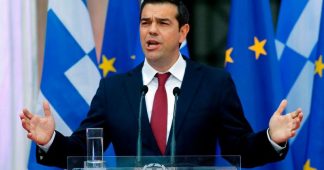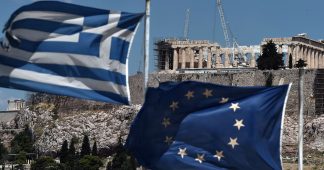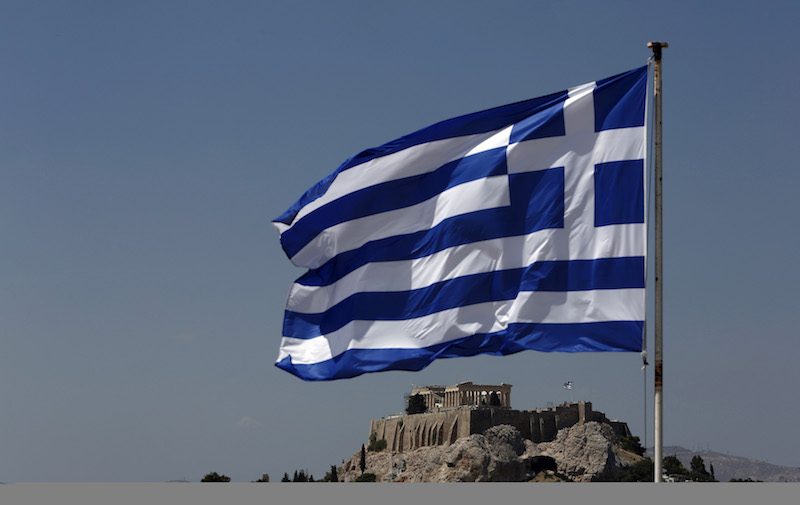14 December 2016
On 7 December 2016 Greece remitted €299 million to the IMF. This sum corresponds to a part of the “bail-out” that was granted in 2010 and is all at the same time illegal, illegitimate, odious and unsustainable.
To start with, only 5% of the sums granted in 2010 and 2012 were effectively entered onto the Greek budget thus rendering the loan illegitimate. The other 95 % was used either to pay back loans to foreign private banks or to recapitalise Greek banks. These figures are from the German think-tank “The European School of Management and Technology” which cannot, in any way, be considered a revolutionary organisation. This certainly was a bail-out but not for whom it was officially announced. The beneficiaries are not the Greek people but Greek and foreign banks that were bailed out thanks to IMF loans. This is a debt that is illegitimate as regards the Greek people who are asked to pay (with a 3.6% interest rate!) a bail-out caused by the financial crisis. The preliminary report by the Commission for the Truth on Greek Debt, created by the former President of the Greek Parliament, clearly showed that the “Greek problem” did not arise through excessive government spending but through plastering up the banking crisis with public money.
Also, the debt reclaimed by the IMF is entirely odious. According to the judicial doctrine of odious debt that rests on national and international jurisprudence, a debt may be qualified as “odious” if it fulfills two conditions: that it produces no advantages for the population of the borrowing state, and that the lenders were aware of this possibility. [1] A report published in July 2016 by the IMF’s independent office proves that the qualification of “odious” perfectly describes the Greek case. In fact, the IMF Governors knew full well, as far back as 2010, that the Greek debt was unsustainable and that the austerity measures imposed on the country would aggravate the situation.
This affirmation is based on the Minutes of IMF Executive Board Meeting, May 9, 2010 in which the question of Greek debt was considered. The Argentine representative said: “Harsh lessons from our own past crises are hard to forget. In 2001, somewhat similar policies were proposed by the Fund in Argentina. Its catastrophic consequences are well known.(…) there is an undisputable reality that cannot be contested: a debt that cannot be paid will not be paid without a strong process of sustainable growth (…) We are also too familiar with the consequences of “structural reforms” or policy adjustments that end up thoroughly curtailing aggregate demand and, thus, prospects of economic recovery (…) it is very likely that Greece might end up worst-off after implementing this programme. The adjustment measures recommended by the Fund will reduce the welfare of its population and Greece’s true repayment capacity”. The Swiss representative was favourable to a serious examination being given to restructuring the debt as a means of assuring budgetary stability and putting part of the adjustment burden on to the creditors. He then asked the key question: “Why has debt restructuring and the involvement of the private sector in the rescue package not been considered so far?” In fact, if the IMF had applied its usual criteria of sustainability it would have imposed a restructuring of Greek debt from 2010. Why did it not do so? And, why did it go so far as to change its rules in order to be able to lend to an insolvent country?
The reply was given three years later in another IMF report that underlined that private banks had taken advantage of the delay in debt restructuring to “reduce exposures and shift debt into official hands”. [2] As was declared by the former Greek representative to the IMF and a former economic advisor to Barroso when auditioned by the Debt Truth Audit Commission in the Greek parliament, the former Managing Director of the IMF, Dominique Strauss-Kahn, deliberately excluded Greek debt restructuring in 2010 in order to protect European banks, particularly the French and German banks, who were the most exposed.
On top of all that, the Greek debt is quite simply illegal. On the one hand, the measures imposed in exchange for the loans violate Greek sovereignty and numerous conventions on Human Rights, as was pointed out by the UN expert on debt in his report on Greece. [3] On the other hand, the Greek government has never, as the Greek constitution requires, ratified the 2010 loan agreement.
Illegitimate, odious and illegal, the Greek debt is also unsustainable, more now than in 2010 because of the policies imposed by the three memoranda that are daily destroying the economy and the well-being of the population. The debt burden, that prevents the government from fulfilling its obligations regarding fundamental rights, grows heavier in tune with the austerity measures and privatisations demanded by the creditors, creating a vicious circle of ever greater government borrowing to pay ever greater debt.
To break the circle of crime it is necessary to unconditionally abolish the odious, illegal, illegitimate and unsustainable part of the Greek debt. The remittance made by the Greek government on 7 December was double the budget allotted (€130 million) to the struggle against extreme poverty in 2015 which benefited the 400,000 poorest people in the country and which the Troika judged to be exorbitant. It is also more than the budget allocated to the government’s programme of parallel measures, evaluated at €200 million, for humanitarian emergency and to compensate the effects of the third memorandum, to provide health cover for 2.5 million Greeks. This programme was withdrawn from the Parliament’s agenda under pressure from the creditors who threatened to hold back the next instalment of funding.
The Greek Debt Truth Commission is under no illusion: there will be no decision from the IMF to cancel Greek debt in spite of its own reports admitting its implication in the Greek turmoil and its recent favourable declarations concerning debt relief, albeit without creditor participation and with an increased dose of austerity measures. Neither will it come from the Eurogroup whose Finance Ministers met on 5 December. It is fruitless to believe that a just solution to the Greek debt situation is possible in the current negotiating environment.
For these reasons our Committee favours the adoption of unilateral measures to suspend or repudiate illegitimate, illegal, odious and/or unsustainable debt based on solid legal arguments such as those expounded in the preliminary report of the debt audit Commission. Such measures should be immediately accompanied by others aiming to socialise the Greek banking sector and to strictly control capital movements.
Translated by Mike Krolikowski
Published at www.cadtm.org
